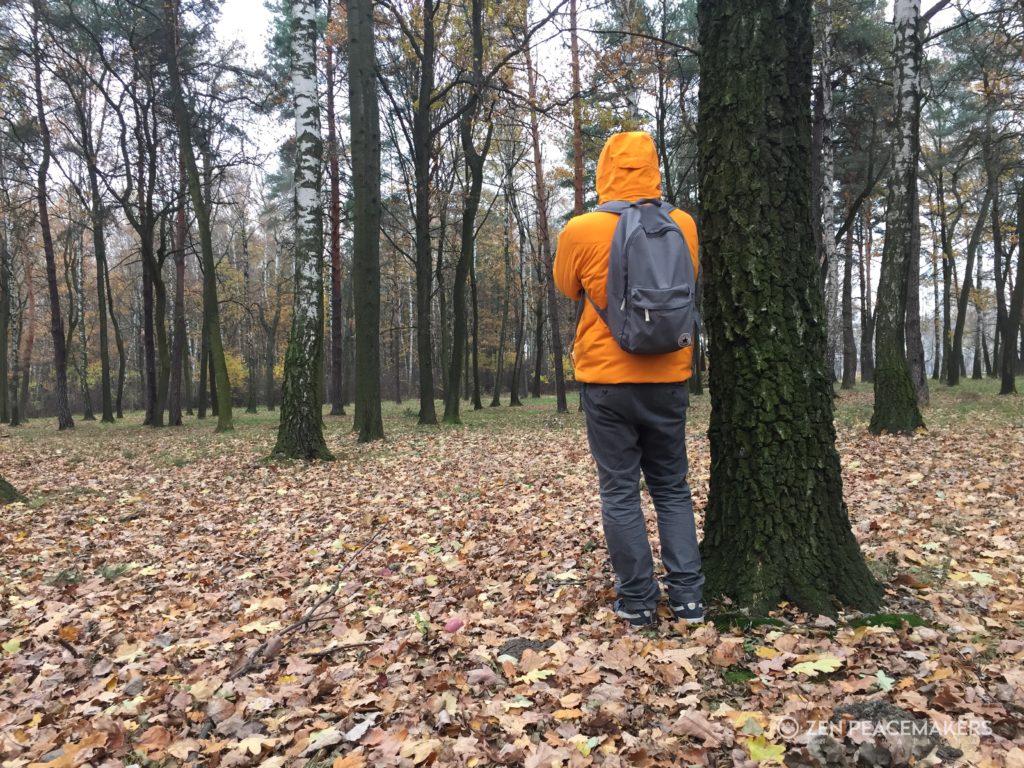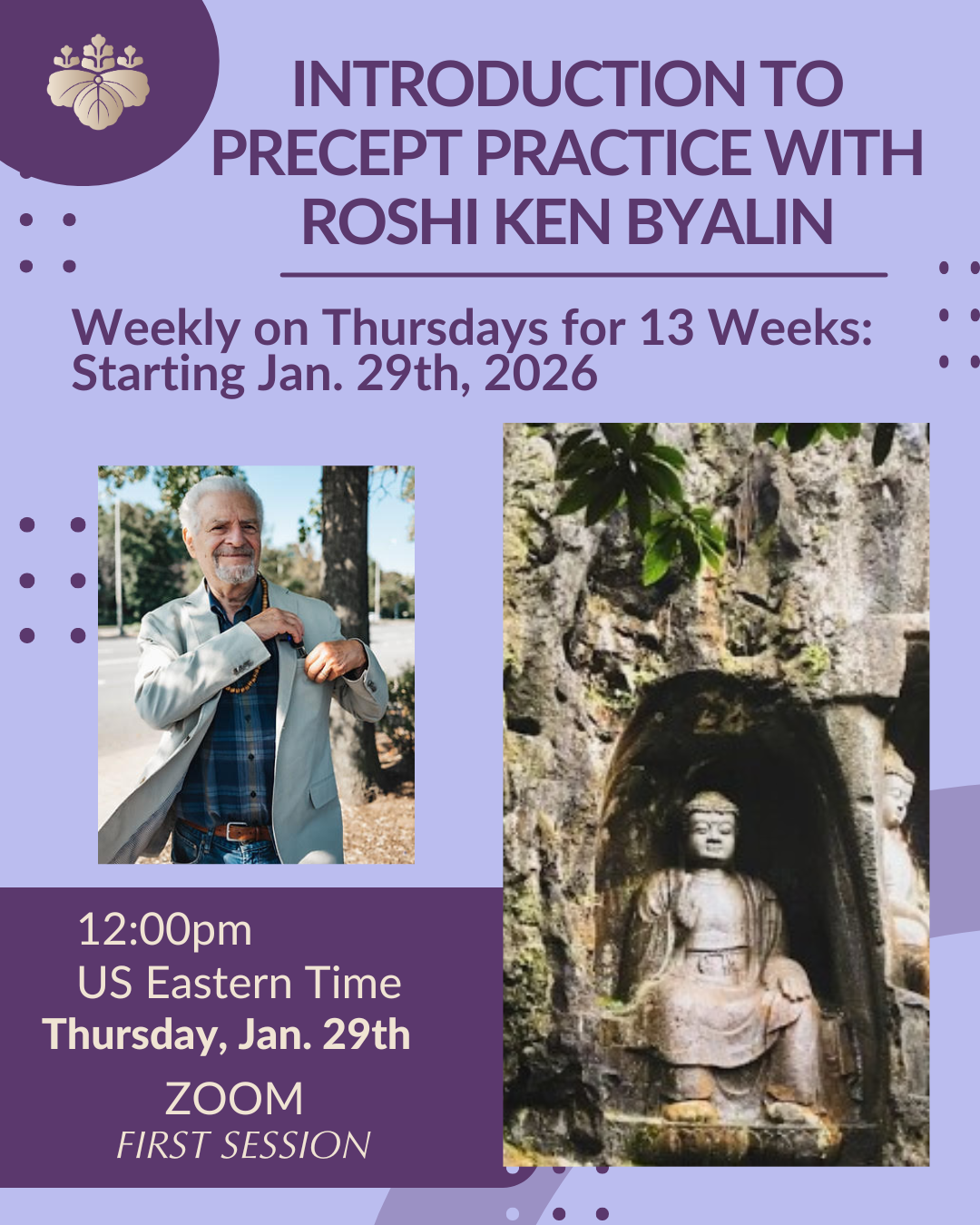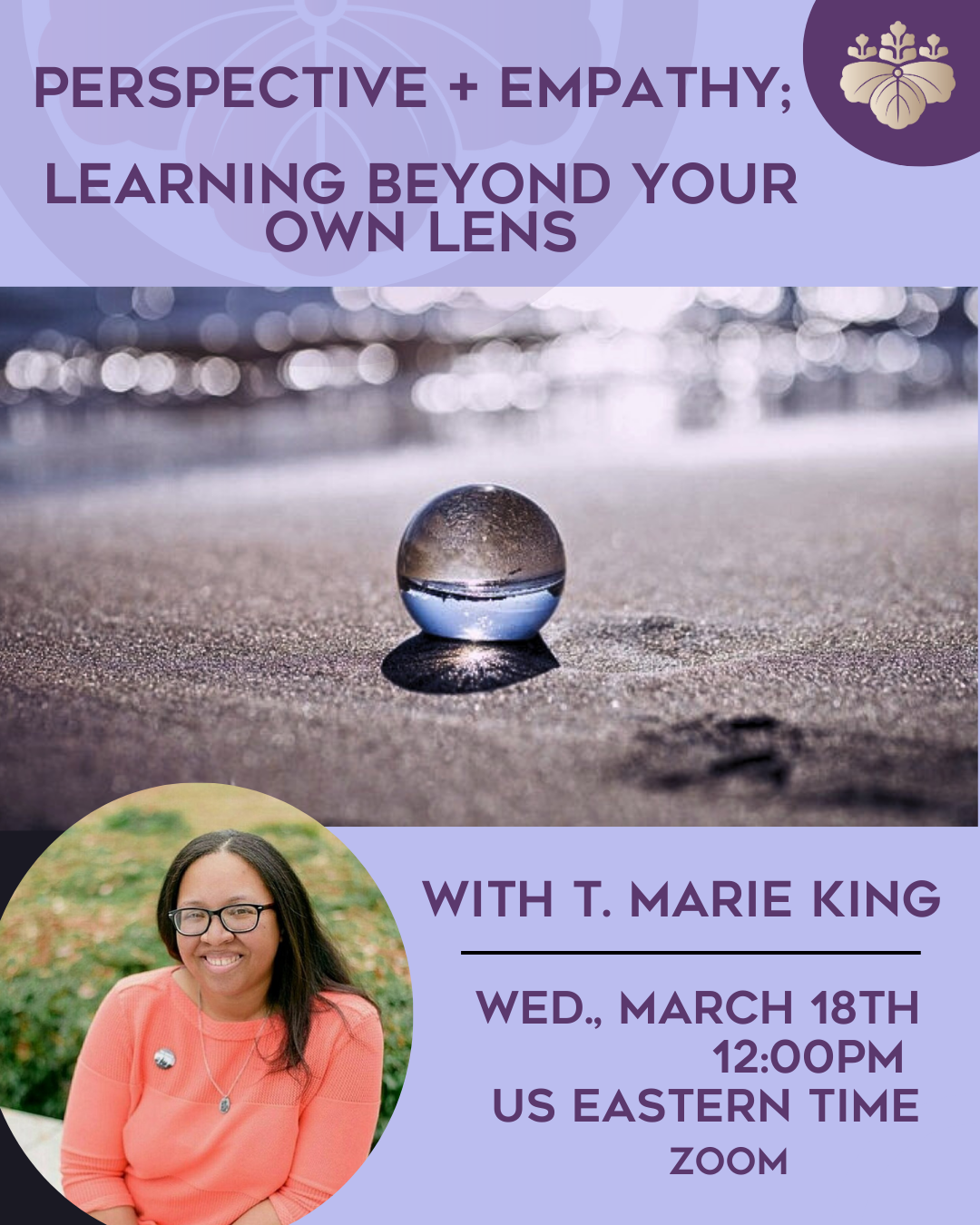Editor's Note: Many who have been motivated by the practice of Bearing Witness retreats and by the Three Tenets of the Zen Peacemakers, have self-organized and led programs around the world. Covering themes from refugees, minorities, environment, local civil wars and others, they widen this unique, planetary net of awareness. Below is an article by Ohio USA Sensei Robert Ertman who participants in several of these programs.
. . .
Do Not Look Away: A Reflection by Sensei Robert Jin Gen Ertman
This article was first delivered as a sermon by Sensei Ertman at the Unitarian Universalist Church of Annapolis on July 29, 2018
This is one of my favorite places. It’s a grove at Auschwitz-Birkenau. Peaceful. Serene. Beautiful.
I’ve been going to Bearing Witness Retreats at Auschwitz with the Zen Peacemakers each year for a while now and I’ll be back there this November. We spend most of the days sitting Zen between the railroad tracks where the selections were made. Only the strong were selected to live until they were worked and starved to death; most–the old, the young, the infirm–were marched to the gas chambers upon arrival. In the mornings, we sit in silence. In the afternoons, we sit and listen, taking turns reading the names of the dead. Some days are sunny but we sit in the rain, the sleet, the snow, the cold.
What we are doing is practicing the Three Tenets of the Zen Peacemakers— “practicing” means living them, not pondering them but making them a part of our lives. The first tenet is “Not Knowing.” Bernie Glassman, Zen master and founder of the Zen Peacemakers, explains that “Not-Knowing is entering a situation without being attached to any opinion, idea or concept. This means total openness to the situation, deep listening to the situation.”
In most times and places, it’s really hard to give up our favorite ideas. But Auschwitz is a place of Not Knowing. What happened there, what was done there, is beyond understanding. None of the ideas we bring are adequate and so “Not Knowing” flows over us like a river.
The second tenet of the Zen Peacemakers is “Bearing Witness.” We Bear Witness to the joy and suffering we encounter. Bernie says that, “Rather than observing the situation, we become the situation. We become intimate with whatever it is – disease, war, poverty, death. When you bear witness you’re simply there, you don’t flee.”
My own practice there is, “do not look away.” There is much that is hard to look at, hard to become. But we gather to light candles and chant around a pond where human ashes were dumped. We do not look away. We gather along ditches and fields where ashes were dumped, and chant. We can’t sit there because the earth is wet and spongy. We do not look away. We sit in the children’s barracks—the children were kept for Dr. Mengele—and sing nursery songs to give comfort to the spirits of the children. I do not look away, even though I cannot sing and can hardly breathe. (Atheist and humanist that I am, I do not doubt that there are souls there.)
I think you can understand why the grove drew me in—so Peaceful. Serene. Beautiful. I was distressed when I found out that the place had a name, “The Grove of the Hungarian Women.”
When the number of people selected for death exceeded the capacity of the gas chambers, they were made to wait in this grove. One day a few Sonderkommando–prisoners assigned to work in the gas chambers and crematoriums– obtained a stolen camera and at great risk photographed a group of women, Hungarian Jews, who had been stripped and were being driven out of the grove to the gas chamber. They also photographed prisoners burning corpses in an open pit; the capacity of the ovens also having been exceeded. The photos were smuggled out to the Polish underground and distributed, but the world, for the most part, looked away.
After the war and the liberation of the camps, a scrapbook was discovered by merest chance, with snapshots taken by SS photographers documenting the destruction of the Hungarian Jews.
So the grove was a place of horror but also a place of brief respite. And in a miracle of ascendant humanity, there was also joy and love, from which we should not look away.
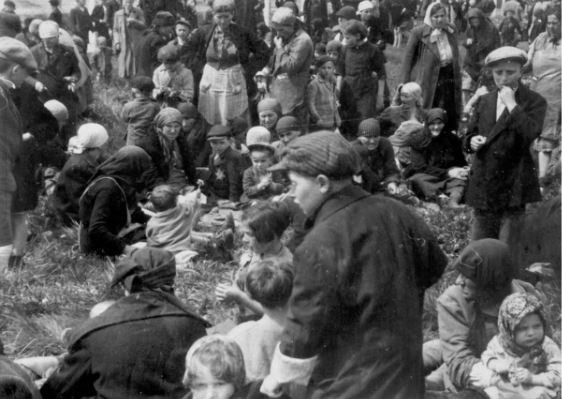
Look closely, and you will see a little child extending a flower to an older boy. Do not look away.
The grove is still one of my favorite places. And I can call it by its name.
The third tenet of the Zen Peacemakers is Loving Action, the right actions which arise naturally when we practice Not Knowing and Bearing Witness, when we enter a situation without any fixed ideas and then become that situation.
Why do we do this? Other Buddhists can abide in the blissful realm of not-knowing and non-attachment. We are determined to live in the world of attachment, because, as Bernie tells us, that is also the world of empathy, passion, and compassion. We are practicing engaged Buddhism, engaged with the interdependent web of being of which we are all a part. In Zen, we speak of the underlying oneness of the universe, but I prefer the UU statement.
One year I went to Krakow early for a workshop on Not Knowing and Bearing Witness. It wasn’t what I expected, not at all.
In the morning, we were paired off to speak and listen. We were given topics like “tell about a time that you felt unconditionally loved.” One would speak and the other would listen, without judgement or comment. Then the other would repeat back what they heard, adding nothing, omitting nothing, being corrected as necessary. Then the roles were reversed. Most of us found that we were careless listeners and had our own agendas but we got better as the exercises went on and most of us grasped that Not Knowing and Deep Listening are necessary to one another.
After lunch, we went out to the plaza, the old Market Square, and we paired off again and took turns being blindfolded and led around to experience different sounds and smells and the treacherous cobblestone pavement. We also experienced trust and caring. We finished up with coffee and talked about the day, but one among us was angry, "Is that it? Is that it! Did I miss something!?"
Now, the room was top-heavy with experienced Zen teachers—I was brand new—and some of them tried to explain to him that, yes, he had missed something, but he wasn’t having any of it and he became angrier, "I'm not feeling heard!!"
I don’t know, but I don’t doubt that our companion learned a lot at Auschwitz that he would never have learned any other way; he wept much of the time. I don’t know, but I’m afraid I doubt that he learned much about Not Knowing and how to practice it in daily life.
Just think of the possibilities—letting our fond opinions go and really listening to others; listening without any agenda, not looking away from their hopes and fears which may be so different from our own. Just think of the people to whom we could listen—our children, our spouses, members of our congregation … mere acquaintances and strangers, people who may have voted for politicians we despise … and fear.
And just think of the things to which we may be called to Bear Witness, the things from which we must not look away.
And just think of the loving actions, the right actions, which may arise from our Not Knowing and Bearing Witness.
Just Do Not Look Away.
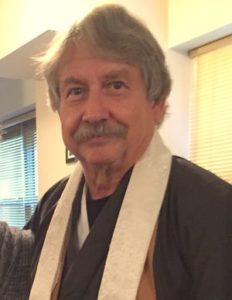 Sensei Bob Jin Gen Ertman is a dharma heir of Rose Mary Myoan Dougherty, Sensei, and a long-time member of the Silver Spring Zendo/One Heart Sangha. He is currently serving as the guiding teacher. He is also a member of the Zen Peacemakers and is grateful for the way it has shaped his practice in all of life. He writes and teaches haiku as a practice of being fully in the present moment. Bob is a retired federal attorney and lives in Annapolis with his wife, Phyllis. Together they are facilitators of a Mindfulness Practice Group at the Unitarian Universalist Church of Annapolis. In his spare time, and for the past 24 years, Bob has been collecting fossils, with his daughter Hallie.
Sensei Bob Jin Gen Ertman is a dharma heir of Rose Mary Myoan Dougherty, Sensei, and a long-time member of the Silver Spring Zendo/One Heart Sangha. He is currently serving as the guiding teacher. He is also a member of the Zen Peacemakers and is grateful for the way it has shaped his practice in all of life. He writes and teaches haiku as a practice of being fully in the present moment. Bob is a retired federal attorney and lives in Annapolis with his wife, Phyllis. Together they are facilitators of a Mindfulness Practice Group at the Unitarian Universalist Church of Annapolis. In his spare time, and for the past 24 years, Bob has been collecting fossils, with his daughter Hallie.

